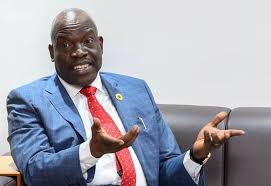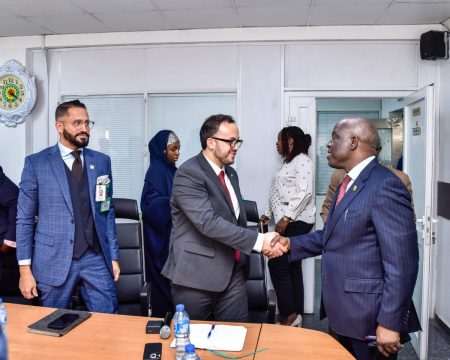
Oritsegbubemi Omatseyin
Lagos — The Nigerian Upstream Petroleum Regulatory Commission, NUPRC, organised an anti-corruption workshop in commemoration of the International Anti-Corruption Day, reaffirming its commitment to fighting corruption in the oil and gas sector.
NUPRC’s Commission Chief Executive, Engr. Gbenga Komolafe, speaking on this year’s theme, “Uniting with Youth Against Corruption: Shaping Tomorrow’s Integrity,” stated that the fight against corruption is crucial for sustainable development, equity, and national progress.
Komolafe stated that the oil and gas upstream sector is the cornerstone of Nigeria’s economy and NUPRC as the regulator ensures that the nation’s hydrocarbon resources are managed with transparency, accountability, and efficiency, in line with the principles of the Petroleum Industry Act (PIA) 2021, which emphasises good governance and transparency.
He highlighted that the Commission has achieved significant milestones in fighting corruption with the implementation of the Oil and Gas Industry Service Permit, OGISP, Portal which reduces human interaction in permit processes and consequently the incidents of bribery, an open and competitive bid round which ensures transparency in awarding licenses and leases, and the recently launched HostComply platform to enhance the administration of the Host Community Development Trust, HCDT.
Komolafe further expatiated on the Audit of Upstream Measurement Equipment and Facilities Regulation which aims to address gaps in the system including outdated measurement equipment, and the Advance Cargo Declaration Regulation which tracks crude oil transportation and export from Nigeria.
Additionally, he noted that in line with the Independent Corrupt Practices and Other Related Offences Commission, ICPC, vision that MDAs must first address corruption within their organisations, the NUPRC Anti-Corruption and Transparency Unit, ACTU, was established to promote transparency and accountability within the organisation.
The unit has created awareness through sensitisations and training, system studies, and review of NUPRC’s major regulatory activities. The unit has also established an anonymous whistleblowing policy.
According to Komolafe, these efforts have cumulatively yielded results such as greater investor confidence and increased revenue inflow into the Federation account.
The keynote speaker of the event, Mr Femi Falana SAN, expressed his delight at the invitation of the CCE. Falana stated that the invitation is proof that the Commission has nothing to hide and is committed to transparency and closing gaps in all processes.
Mr. Falana emphasised that corruption is a pervasive issue in society, necessitating collective efforts to combat it. He stressed the importance of integrating young people in the fight against corruption. Furthermore, Mr. Falana highlighted that existing laws are sufficient to tackle corruption, but a strong political commitment is required to drive the fight.
Falana commended the Commission for its initiatives in fighting corruption, including the development of regulations. He urged all parties to support federal agencies in their anti-corruption efforts and pledged his support for the Commission. Mr. Falana also stated that the Commission should be recognized as a role model for other organisations in the fight against corruption.
In a similar vein, Mr. Olusegun Adigun, Director of System Study and Review at the Independent Corrupt Practices and Other Related Offences Commission, ICPC, expressed gratitude to the Commission Chief Executive for supporting the Anti-Corruption and Transparency Unit, ACTU.
He noted that the sensitisation programme provides an opportunity for management and staff to understand their role in building an ethical institution and preventing corruption. Mr. Adigun encouraged NUPRC ACTU to continue its efforts in fighting corruption.
To promote integrity, diligence, and honesty, NUPRC ACTU, in collaboration with ICPC, presented awards of integrity to three deserving staff members.
Also, The NUPRC in collaboration with the Nigerian Boundary Commission, NBC, and other stakeholders, hosted a workshop on littoral (coastal) communities.
The event aimed to enhance understanding of the newly gazetted regulations under the Petroleum Industry Act (PIA), especially the Host Community Development Trust, HCDT. The HCDT framework is designed to ensure that Oil and Gas operations benefit local communities, promoting sustainable development and mitigating the environmental impact of resource extraction.
Key topics included regulations for managing environmental remediation, Gas flaring reduction, and the establishment of funds for community development and decommissioning of oil facilities. The workshop also explored alternative dispute resolution mechanisms to resolve conflicts between Oil producers and host communities more efficiently.
| ReplyReply allForward |



